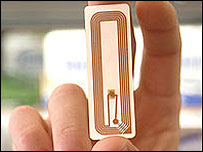July 05, 2004
'Magic ink' that makes metal grow
An eco-friendly way of "growing" metal for circuitry or antennas has been developed by UK firm QinetiQ.
The metal printing technique replaces conventional copper etching by using a special ink which attracts metals.
It means antennas for tiny mobiles or radio frequency identification (RFID) tags, used for tracking goods, could be made cheaply and quickly.

RFID tags are tiny microchips that talk to each other and experts predict they will be big business by 2006.
They are widely tipped to replace eventually the barcoding on products. Because they connect by radio, they do not require the scanners, so familiar with the barcoding system, to read their unique identification codes.
The metal printing technique could transform how RFID tags are made.
"The very basic principle is that you apply an ink to a surface that is water resistant, like a flexible plastic," Chris Bishop, general manager of QinetiQ Metal Printing (QMP), explained to BBC News Online.
"When you pass it through an electroless chemical solution, metal will 'grow'. It is not a special solution; it is an industry standard one."
'Magic dust'
The secret lies in the ink, the ingredients of which QMP is keeping a secret. To Mr Bishop, it simply contains "magic dust".
After the ink is printed on to a flexible or rigid surface, the surface is lowed into a tank which contains the electroless solution.
The solution is made up of metals which are attracted to the ink. A quarter micron (millionth of a metre) of metal can be grown within two minutes.
Metal printing is 50% cheaper than conventional methods which use etching - acid and copper - but the bigger benefit is that it is far more environmentally friendly.
This could spell good news for manufacturers gearing up to mass-produce RFID tags, once issues surrounding common standards are ironed out.
"The electroless solution lasts for six to eight weeks, and it is non-toxic, which means workers can be in the same room without the need for protective clothing," said Mr Bishop.
"And because we are not etching copper with an acid, we have no acid to dispose of."
Other agents associated with conventional circuit etching methods include the use of chromium.
A European Union directive requires companies to stop using six hazardous and carcinogenic materials, including chromium, after July 2006.
"The major benefit for us is that it takes less time, less space, it is environmentally friendly and it uses fewer materials," said Mr Bishop.
"Although the world is blessed with copper, if you can just apply copper where you need it - that is far better."
Wallpaper circuitry?
The technology was developed by QinetiQ, formerly Dera (Defence Evaluation and Research Agency), because it needed to make sheets of frequency selective surfaces (FSS) for radar applications.
FSS only let certain wavelengths pass through them and are most often found in devices like microwave ovens.
QMP is currently in talks with major blue-chip organisations to farm out the technique as a mass production system.
But it has already used the method in some commercial goods it has manufactured on site.
The biggest potential for the technique lies in the production of RFID tags, however.
Applications for RFID tags are endless: they can be embedded in goods - such as trainers or razor blades - so that they can be tracked by manufacturers and suppliers.
They can also be combined with sensors so that a tagged crate of refrigerated goods could alert a system if perishable items inside became too warm, for example.
Even though privacy groups have voiced concerns about the potential misuse of the technology, RFID tags look set to become commonplace soon.
But looking ahead, the metal printing technique could also be used to help miniaturise devices. Mobile antennas could be printed into the casing of the phone, for example, reducing bulkiness in mobiles.
Or special wallpaper could be printed which could covertly block radio frequencies, such as mobile phone or Wi-fi (wireless broadband) signals.
"It gives you the ability to print very fine metal patterns that could be used in biosensors or security features where you need to print a pattern and pass an electrical current through it," said Mr Bishop.
So far, QMP has filed 11 international patents for the technology, three of which have almost been finalised.
Posted by thinkum at July 5, 2004 12:18 PMMathematics may be defined as the subject in which we never know what we are talking about, nor whether what we are saying is true. by free online poker
Posted by: free online poker at December 27, 2004 03:34 AMonline poker - texas hold'em poker, online poker | poker stars - internet poker, texas hold'em | world poker tour - empire poker, internet poker | empirepoker - party poker, poker online | world series of poker - world poker tour, poker supplies | paradise poker - internet poker, party poker | texas hold'em poker - internet poker, world series of poker | poker chips - poker books, poker supplies | internet poker - party poker, free online poker | texas holdem poker - poker games, poker | online poker sites - poker, partypoker | paradise poker - poker rules, online poker rooms | pacific poker - poker books, online poker rooms | texas holdem poker - pacific poker, online poker sites | free online poker - poker books, internet poker | pacific poker - poker supplies, WPT | poker books - texas holdem poker, free poker online | online poker rooms - poker supplies, texas holdem poker
Posted by: poker tournaments at February 17, 2005 05:13 AM